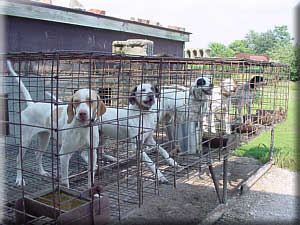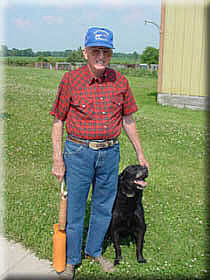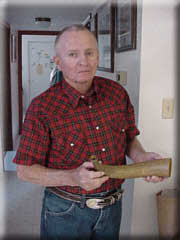Bird Dog Aficionado Points To Chelation Therapy
In September of 1999, 68 year-old Tom Love was hunting grouse and woodcock in Michigan with some of his lifelong friends. Tom says that normally he walks his buddies "into the ground", but he found he could not keep up and was constantly out of breath. He discussed his problems with his friends, and they suggested that he get his heart checked out. When he returned home, he made an appointment at the Methodist Hospital in Indianapolis, Indiana.
In October of 1999, he met with a heart specialist, Dr. Doug Pitts. After several tests, Dr. Pitts told Tom that his lung needed to be "fixed." The tests showed fluid around the lining of his right lung, as well as a dime-sized "spot" on the same lung.
PLEURAL EFFUSIONS AND FIBROSIS
Chest films taken on October 15, 1999 showed pleural effusions on the right and a three centimeter mass in the right inferior peritracheal region. On October 20, 1999, Dr. James Pike, a pulmonologist, performed a thoracentesis which produced 1400 cc's of straw-colored fluid. Tom's history of extensive asbestos exposure suggested a differential diagnosis of mesothelioma, and his doctors recommended a pleural biopsy. On November 17, 1999, Dr. David Hormouth conducted a fiberoptic bronchoscopy and thoracoscopic pleural biopsy, resulting in a working diagnosis of fibrosis and reactive mesothelial proliferation. The tests did not confirm any malignancy.
Tom was then referred to a cancer specialist, Dr. Frank Workman, who wanted to perform surgery, which Tom was reluctant to undergo. In the past, Tom has had a couple bad experiences while under anesthesia and continues to avoid any medical procedure that requires anesthesia. Tom then learned through a neighbor of a physican who offered an alternative therapy using chelation.
CHELATION THERAPY
Chelation therapy is a medical treatment that purportedly improves metabolic and circulatory function by attempting to remove toxic levels of metals from the body, such as lead and cadmium, and abnormally located nutritional metallic ions, such as iron. This is accomplished by administering an amino acid, ethylene-diamine-tetra-acetic acid (EDTA), by an intravenous infusion using a small 25-gauge needle.
Tom's first chelation treatment was in late November, 1999. He had 24 additional treatments. He felt well enough in January to take his dogs to Childress, Texas and hunt. When he returned he had twelve more treatments. He stopped his treatments in August of 2000.
In December, 2000 Tom began to have shortness of breath and right-sided pain. Even short walks with his beloved hunting dogs were wearing him out. A chest film showed the spot on his lung had grown to the size of a quarter. He underwent two more weeks of chelation therapy and returned for another chest film. The films showed no reduction in the spot.
PLEURAL SCARRING VX. MALIGNANT PROCESS
Tom met with his osteopath, who suggested that Tom find a physician that would inject chemotherapy directly into the tumor to destroy it. Before making a decision, Tom wanted to hear what Dr. Pike had to say. Dr. Pike reviewed Tom's latest chest films and felt that the nodule was reflective of pleural scarring rather than any malignancy. He ordered a CT scan to give Tom a "complete sense of comfort."
On April 13, Tom underwent a pulmonary function test, which revealed a significant decrease in lung capacity and respiratory reserve. On May 7, Tom underwent a needle biopsy at the Indiana University Medical Center. The surgeon was Dr. Meyer. On May 9, Dr. Pike telephoned Tom and informed him that the pathology department had reached a definitive diagnosis of malignant mesothelioma.
DR. PASS PREPARED TO OPERATE
On May 17, Tom drove to Detroit, Michigan and met with Dr. Harvey Pass at the Karmanos Cancer Center. After reviewing his records, Dr. Pass wished to examine more closely the slides of the procedure performed in 1999, as well as the tissue specimens taken at Indiana University. After an initial workup, Dr. Pass approved his candidacy for surgery. Tom expressed his reservations regarding surgery, and Dr. Pass responded that he should consult with Dr. Nicholas Vogelzang in Chicago.

Tom is currently pursuing a less invasive treatment strategy. For the past four weeks, he has been taking Poly-MVA, a form of liquid chemotherapy. He feels this is helping and that his condition has stabilized. He plans to continue taking Poly-MVA as long as it is working. Tom reports that one good side effect of the Poly-MVA is that his appetite has improved. He has not gained any weight back, but he has not lost any weight since taking Poly-MVA. Tom provides the following ordering information:
AMARC (www.polymva.net)
539 Telegraph Canyon Road #281
Chula Vista, CA 91910
800.960.6760
619.656.1980
fax: 619.585.2980
GREENER PASTURES
Tom and his wife Janet live in Pittsboro, Indiana. He was born in Nashville and raised nearby. He is one of seven children. According to Tom, as a youngster he was taught the Three Rs: "Reading, Writing and Route 31." Route 31 heads directly north out of Nashville and is the road Tom and several of his buddies took as soon as they were old enough.
Tom was trained to work in battlefields in Korea as a medic. He was sent to Germany after the cease-fire. The injuries he witnessed as a medic were mostly sustained as a result of bar-room brawls. When he was discharged he wanted to "go to work, make money and enjoy life."
Tom did so, and created a wonderful family life in Pittsboro, Indiana.
DOTING GRANDFATHER
Tom has three adult children, and four granddaughters. The baby is almost two years old. She lives one mile away and he sees her daily. The six and nine year-olds will arrive any day to spend the summer with him and his wife. The oldest granddaughter is eighteen and Tom sees her three or four times a week. She just graduated from high school with honors. Tom and his wife helped raise her after her mother, Tom's daughter-in-law, was killed in a tractor accident when the granddaughter was five or six years old. Tom loves spoiling his granddaughters and spending time with them. He regrets that he can no longer pick them up or play with them like he could before falling ill.

TEXAS BIRD HUNTER
Tom is an avid outdoorsman and bird hunter. For the last 20 years, he traveled to Childress, Texas, where he shares a bird lease. He would often stay as long as a month. He also hunted in Michigan for grouse and woodcock, and Indiana for duck and dove.
The Love spread is "just a small place" on 240 acres in Pittsboro, and the Loves share the land with around 20 bird dogs -- pointers, setters and labs. The labs he uses only for dove hunting, the other bird dogs for ducks, grouse and pheasant.
Until last year, Tom's greatest hobby, sport and thrill was raising, training and showing his bird dogs. He and his wife would often travel to competitions in Ohio, Kentucky, Tennessee, Iowa, Illinois and Texas. They would usually be gone for a few days, sometimes up to a week. His son and granddaughter would fill in around the farm. Tom spent a lot of time and money promoting the competitive bird dog association called National Shoot to Retrieve Field Trial Association. His dogs have won or placed at several national competitions, as his trophy case attests.
In April 2000, Tom felt so bad he could not attend a competition that was only 30 minutes away. He said it is embarrassing to have the ole' boys he used to run with see him like this. Since last December, Tom has not been able to do any bird dog training. He can no longer walk with the dogs or bend over to pick up the pups. He has not been able to hunt. He says he is in trouble if he has to run three steps.
LIKE HAVING AN ITCH YOU CAN'T SCRATCH
Since falling ill with mesothelioma, there is little Tom can do on his place. His son, daughter and son-in-law help out. He is no longer able to pick up feed or load it in the truck. He cannot perform repairs around the house, or even help his wife with housework as he used to. He cannot lift the vacuum cleaner. He cannot visit his friends and he takes frequent naps. Tom says if he could visit friends, he'd be visiting East Texas friends and West Texas friends.
Tom is currently experiencing shortness of breath. He feels if it gets worse he will have to be put on oxygen. Before going on Poly-MVA, Tom had noticed that his appetite was diminishing. He had lost eight to ten pounds over the course of three weeks. He has been trying to eat very healthy foods, lots of fruits and vegetables, but he can no longer eat tomatoes, which he has loved all his life.

Sometimes it's hard, because everything he loves -- but can't enjoy -- is at his fingertips, every hour of the day and night. He looks out his window on a fine summer day and sees beautiful cornfields stretching to the horizon. He sees his dogs springing, expecting their daily run. He sees his children working on the farm, and his grandchildren playing in his house.
THE CALL OF THE FOXHORN
When Tom passes by his trophy case, something will catch his eye and trigger memories. He picks up the foxhorn that his father made and sold to an old friend, and which in turn the old friend later gave to Tom. Tom picks up the horn and tries to make it sound, but he does not have the breath, and his eyes mist up as he thinks of the meaning of this gift, of the past, and of the future.
For the most part, Tom Love plows ahead, cheerful and affable. Even though he knows that he faces grim odds, he keeps looking for a way to beat this thing and keep going -- for himself, his family and his friends.
We will keep you posted on the progress of this remarkable gentleman.
*** POSTED JULY 9, 2001 ***
Tom Love passed away on July 22, 2002


